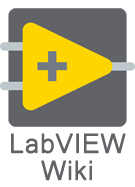LabVIEW Wiki:Contents: Difference between revisions
No edit summary |
m Update Tree |
||
| (6 intermediate revisions by 2 users not shown) | |||
| Line 1: | Line 1: | ||
{| | {| style="border-spacing:8px;width:100%;padding-left: 0px; background-color:#FFFFFF;" | ||
! colspan="2" style="background:#616366; text-align:center; padding:2px; border-bottom:1px #B8C7D9 solid;" | | |||
<div style="font-size:200%; border:none; margin:0; padding:.3em; color:#FFD500;">LabVIEW<sup><small><small><small>TM</small></small></small></sup> Wiki Contents</div> | |||
|- | |- | ||
| | | width="18%" valign="top" | | ||
<h2 style="margin: | {| class="wikitable" width="100%" cellpadding="1" cellspacing="1" style="vertical-align:top;" | ||
! style="vertical-align:top;background-color:#616366" | <h2 style="margin:0;background-color:#616366;font-size:120%;font-weight:bold;border:1px solid #616366;text-align:Center;color:#FFD500;padding:0.2em 0.4em;">Category Tree</h2> | |||
|- style="vertical-align:top;background-color:#EFEFEF" | |||
| <categorytree mode="Categories" showcount="off">Categories</categorytree> | |||
|} | |||
| width="82%" valign="top" | | |||
{| class="wikitable | |||
|- | |- | ||
| valign="top" style="padding:8px 8px 0px 8px; background:#FFFFFF;" | | | valign="top" style="padding:8px 8px 0px 8px; background:#FFFFFF;" | | ||
| Line 13: | Line 21: | ||
==LabVIEW Wiki's reference lists== | ==LabVIEW Wiki's reference lists== | ||
=== Lists === | |||
* '''[[:Category:Lists]]''' — a list of lists in the category system, arranged alphabetically. | |||
=== Glossaries === | === Glossaries === | ||
Glossaries are lists of terms with their definitions: | Glossaries are lists of terms with their definitions: | ||
*'''[[ | *'''[[:Category:Glossaries]]''' — glossaries in the category and subcategories, arranged alphabetically. | ||
=== Portals === | === Portals === | ||
A portal is an introductory page for a given topic. It complements the main article of the subject by introducing the reader to key articles, images, and categories that further describe the subject. Portals also help editors find related projects and things they can do to help improve LabVIEW Wiki in that area. Portals can be found at: | A portal is an introductory page for a given topic. It complements the main article of the subject by introducing the reader to key articles, images, and categories that further describe the subject. Portals also help editors find related projects and things they can do to help improve LabVIEW Wiki in that area. Portals can be found at: | ||
*'''[[:Category:Portals]]''' — portals in the category and subcategories, arranged alphabetically. | |||
*'''[[:Category: | |||
==LabVIEW Wiki's indices== | ==LabVIEW Wiki's indices== | ||
| Line 30: | Line 39: | ||
===Categorical indices=== | ===Categorical indices=== | ||
LabVIEW Wiki's main categorical index system, automatically generated from information (category tags) placed at the end of each article. To learn about how this works, see [[Help:Categories]]. The pages at the top of the hierarchy are: | LabVIEW Wiki's main categorical index system, automatically generated from information (category tags) placed at the end of each article. To learn about how this works, see [[Help:Categories]]. The pages at the top of the hierarchy are: | ||
*'''[[:Category:Categories]]''' — the highest level or "root" category in {{SITENAME}}. | *'''[[:Category:Categories]]''' — the highest level or "root" category in {{SITENAME}}. | ||
*'''[[LabVIEW_Wiki:Categorical index|Categorical index]]''' — an index of ''all'' categories, plus a list of high-level categories, arranged by subject. This category page is an exception to the autogeneration rule, as it is crafted by hand. | |||
|} | |||
|} | |} | ||
[[Category:Categories|{{PAGENAME}}]] | [[Category:Categories|{{PAGENAME}}]] | ||
Latest revision as of 14:28, 7 May 2020
|
LabVIEWTM Wiki Contents
| |||||
|---|---|---|---|---|---|
|
| ||||
